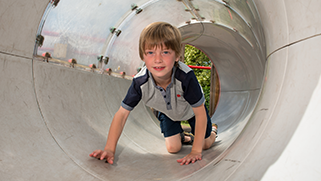No matter how much you want to protect and care for your child, it’s impossible to do so 24 hours a day. For some of the time, you’ll have to rely on others to look after them.

Nobody knows your child better than you, and learning to trust others to care for them can be difficult. But, if you refuse to allow anyone else to look after your child, two problems can arise:
- Your child may become too dependent on you, making it difficult when they eventually need to take responsibility for their own diabetes.
- You’ll be neglecting your own needs. Caring for any child is tiring enough, but when they have diabetes it can be doubly exhausting. By giving yourself a break, even if it’s only the odd hour now and then, you’ll be in a fitter state (both emotionally and physically) to look after your child when they’re in your care.
Carers checklist for children with diabetes
You may need a carer for a variety of reasons – perhaps you need a regular childminder to take care of your child while you’re at work, or maybe you just fancy an evening out. You may opt for a professional childminder or go for a more informal babysitting arrangement with a friend. Whichever you choose, the following checklist will help you plan what you need to do so that you can leave your child safely with somebody else.
- How much does your child’s carer know about diabetes and what are they prepared to do for your child?
- Give the carer as much information as they need about your child’s diabetes, and back it up with written information.
- Is your child’s carer going togive your child insulinordo their blood sugar test? If so, do they know how to do this correctly? Allow plenty of time for teaching and practising.
- Do they know what the blood sugar tests mean and how to respond? Make sure they know what your child’s blood sugar targets are and what to do if their results are outside this range.
- Is your child going to eat with the carer? If so, tell the carer which foods to give your child and when. Make sure they know whether they need to give your child insulin with any snacks or meals, and how much.
- Does your child’s carer know how to recognise and treat a hypo? Give them a written list of your child’s usual hypo symptoms, as well as their usual hypo treatments.
- Is your child going to do any type of physical activity with their carer? Make sure they know how to manage this.
- Give your child’s carer all the equipment they need to look after your child, plus spares in case of accidents.
- Have you given your child’s carer your contact number in case of any problems? Make sure you also give them someone else’s contact number in case they can’t get hold of you.
- Talk to your diabetes team for more individual advice about leaving your child with a carer. Your Paediatric Diabetes Specialist Nurse (PDSN) may be able to help teach your child’s carer about diabetes and how to manage it.
- If you’re going to leave your child with a carer regularly for a long period of time, you may find it useful to give them thewritten healthcare plan that’s recommended for use at school.
- There’s more information on registered childminders onOfsted’s website.
Childcare action points
Discuss your child’s needs around their diabetes with their childminder. Your PDSN should be able to provide training.
- Think about how long you need a childminder for and how often. This will help you decide whether a professional childminder or a friend/relative is more appropriate.
- Check if your childminder needs to be registered withOfsted.
